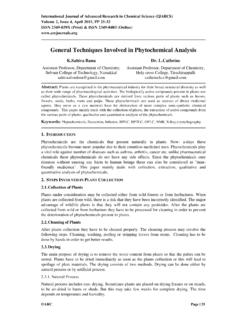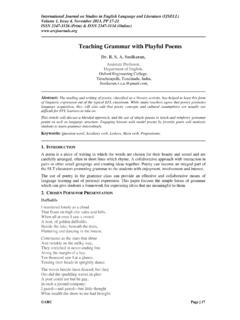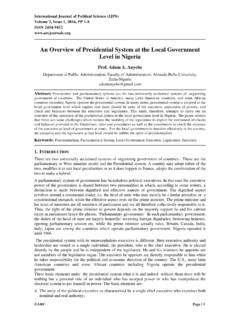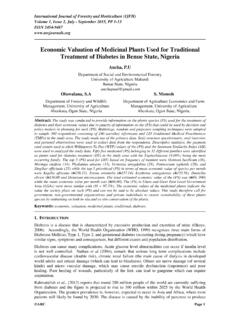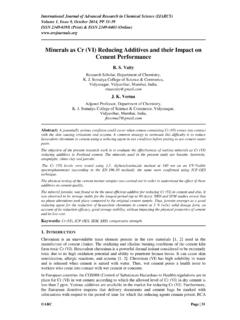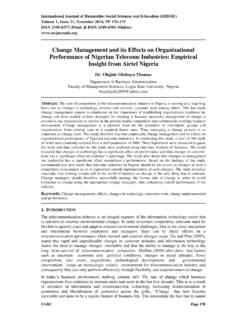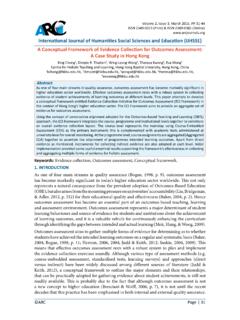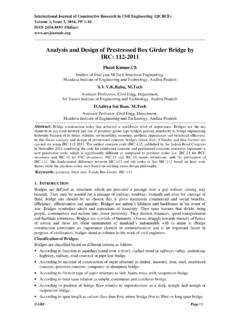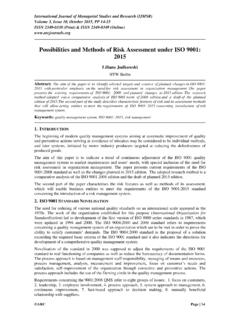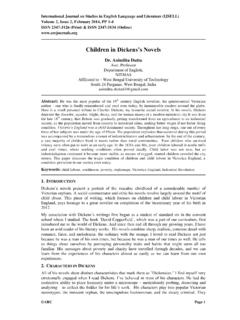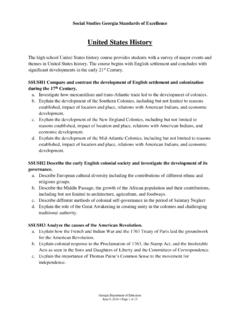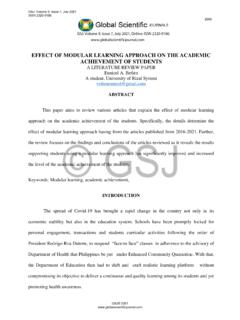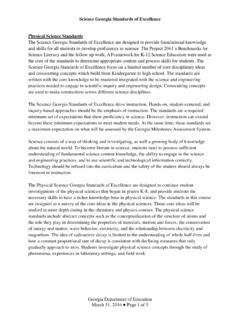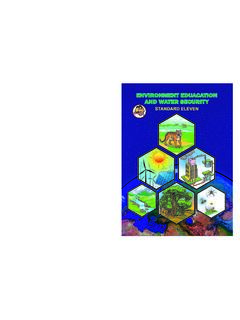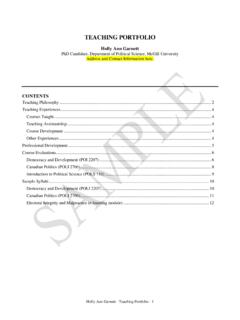Transcription of English Textbook in Ethiopia from Teachers’ and Students ...
1 International Journal on Studies in English Language and Literature (IJSELL) Volume 4, Issue 8, August 2016, PP 91-100 ISSN 2347-3126 (Print) & ISSN 2347-3134 (Online) ARC Page | 91 English Textbook in Ethiopia from Teachers and Students Perspectives: The Case of Grade Twelve Students Textbook Abebe Tilahun School of Languages and Communication Studies Program of English Language and Literature Hawasa University, Hawassa, Ethiopia Abstract: This study investigates how teachers and Students assess the English Textbook they use in grade 12 at Addis Ketema Secondary and Preparatory School in Hawassa.
2 Through a survey questionnaire and semi-structured interview, four teachers and one hundred Students were asked their perceptions of the Textbook . The results showed that teachers and Students had positive perceptions towards the Textbook , English for Ethiopia grade 12. In addition, they gave constructive comments which were useful not only to strengthen the good points of the Textbook , but also to improve its weaknesses. Though the Textbook has many strong sides, both teachers and Students point to some weaknesses in Textbook in terms of its glossary list, shortage of time to cover the stated objectives, lack of models for final achievement tests, placing listening texts in the text book which would have been put in the teacher s guide and missing to include pronunciation lesson.
3 In the light of these findings, the researcher reported some recommendations to address the slight drawbacks of the English Language Textbook for grade 12. Keywords: English Language Teaching, Evaluation of English Textbook , Teachers and Students perceptions, English for Ethiopia grade 12. 1. INTRODUCTION English Language is so widely spoken; it has often been referred to as a "world language", the lingua franca of the modern era. Graddol (2000:2) states that English Language "is the main language of books, newspapers, airports and air traffic control, international business and academic references, science technology, diplomacy, sport, international competitions and advertising".
4 English as a foreign language (EFL) indicates the use of English in non English -speaking regions. In Ethiopia , learning English occurs as part of the normal school curriculum. Barber (1993) states that in many areas, English is used as an official language. And it is thus taught as a subject starting from grade one in almost all elementary schools and as a medium of instructions in some regions (Addis Ababa, SNNPR) in Junior Secondary and in all high schools as well as higher institutions in Ethiopia . One of the most important components of curriculum is the Textbook which provides a clear framework that teachers and learners know where they are going and what is coming next, so that there is a sense of structure and progress.
5 Ur (2006:184) mentions that "the Textbook is the cheapest way of providing learning material for each learner; alternatives, such as kits, sets of photocopied papers or computer software, likely to be more expensive relative to the amount of material provided". Harmer (1991:257) also believes that textbooks supply attractive, interesting and lively materials which may not be produced by teachers. Teachers, Students , and textbooks are among the main elements of foreign or second language classrooms. For many years, the two elements, teachers and Students and their roles were investigated thoroughly, but less attention was given to the issues regarding textbooks.
6 However, in most cases, textbooks represent the hidden curriculum of the language studies in a certain program or country. For this reason, they play an important role for obtaining information about the likely teaching and learning practices of a particular school, program or institution (Richards, 2001) On the other hand, McDonough and Tomlinson (1996) argues that the process of material evaluation can be seen as a way of developing our understanding of the way in which it works and in doing so of contributing to both acquisition and pedagogical practices. Abebe Tilahun International Journal on Studies in English Language and Literature (IJSELL) Page | 92 Textbooks are one of the teaching-learning elements of language.
7 They have different contents, approaches and a target group to address and a goal to achieve. Regarding this idea Richards and Rodgers (2001) and Ur (1996) say Text books have positive and vital roles to play in the day to day language teaching and their importance has become even greater and larger from time to time. They are also critical ingredients in learning the intended curriculum. Statement of the Problem English , apart from being the medium of instruction in both high schools and higher educational institutions, is an important language of communication in the economic, political and social life of Ethiopia .
8 To keep up the function effectively, a frequent assessment and study of the curriculum, the textbooks and the language teachers would contribute to the quality of education. It is for this general reason that ministry of Education has published English for Ethiopia grade1- 12 Students Textbook which has been taught in almost all Ethiopian government schools since 2003/2004 Though this Students Textbook for grade 12 was revised and has been implemented since 2003/2004 , the level of its quality has not been evaluated so far as far as the researcher s experience is concerned. Thus it is timely to conduct this research.
9 There are various text book evaluation studies were conducted both locally and outside Ethiopia . Thus, over viewing some of the studies related to the purpose of this study is worthwhile. To begin with text book evaluation studies conducted outside Ethiopia , Abdulrahman Ali M. Alamri (2008) evaluated the Sixth Grade English Language Textbook for Saudi Boys' Schools; Hamad Al-sowat (2012) conducted study on Evaluation of English Language Textbook "Say It In English " For First Year Intermediate Grade in Saudi Arabia. In Ethiopia , HailuAbera (2008) evaluated the old English for Ethiopia grade 11 Textbook and.
10 Thus, this study will not be only different in setting and content from the above mentioned local and international research studies but also will fill the research gap that exists in English Textbook evaluation in newly published grade 12 Textbook . Purpose of the Study The purpose of this study is to assess the perception of teachers and Students towards Grade 12 English for Ethiopia Students Textbook . Specifically the study tries to answer the following two research questions 1. How do teachers assess grade 12 English for Ethiopia Students Textbook in terms of their Layout and physical appearance, Objectives, Activities and Tasks, Skills, Structure and vocabulary, Language, Subject and Content, and Culture?
